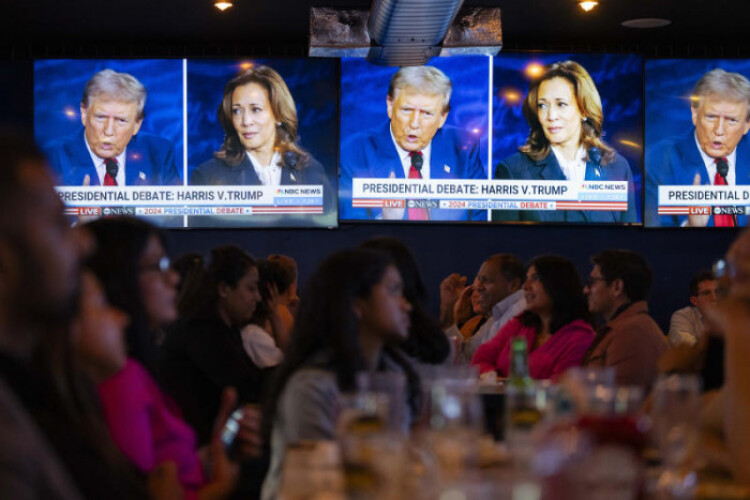
WASHINGTON — Russia continued to push out disinformation to undermine faith in the United States election Tuesday, but American officials said they were bracing for an even bigger assault of false narratives in the days and weeks after the vote.
Central Intelligence Agency (CIA) officials called out a video circulating Tuesday that falsely claimed the spy agency had uncovered cases of fraud in which dead people had voted.
"A fabricated video claiming the CIA identified deceased Americans allegedly voting is absolutely false and is consistent with foreign disinformation that the US intelligence community has long warned about," said Ryan Miller, a spokesperson for the CIA.
Another disinformation campaign targeted the Federal Bureau of Investigation (FBI), prompting the bureau to say its name and logo were being used to spread election falsehoods. One video falsely claimed that the FBI was warning of a terrorist threat to a polling site.
The video involving the CIA used clunky English syntax but had high production values. It was similar to disinformation about the Paris Olympics spread by a Russian group known as Storm-1679 this summer, according to outside experts. US officials confirmed that the video circulating Tuesday was of Russian origin.
In briefings Tuesday morning and at midday, federal officials said that they had not tracked any national-level threats to the vote, but that intelligence agencies had been warning about an increase in disinformation.
Officials said the gravest threats would come in the next few days, as foreign adversaries are likely to stoke doubts about the results or anger over any contested races.
On Monday night, the Cybersecurity and Infrastructure Security Agency, the FBI and intelligence agencies issued an unusual warning that adversaries, led by Russia, were conducting additional influence operations.
On Tuesday, Cait Conley, a senior official with the cybersecurity agency, said she expected an increase in the "scope and scale" of the influence efforts.
"Adversaries have taken lessons learned from previous cycles to understand which narratives would be most effective," she said.
In the second of several briefings scheduled Tuesday, Conley said the foreign adversaries had two goals: undermining confidence in the vote and sowing partisan discord among Americans. And she said foreign countries were trying to hide their hand as they pushed the false narratives.
"We should expect to see narratives around those types of objectives, both today and in the days to come," she said.
The federal officials provided few details on reports of local disruptions, urging the public to listen to local and state officials.
With all the noise and disinformation out there, what Americans need to "really realise is that your state and local election official is the signal through that noise; that is your source for authoritative information on election security," she said.
Federal officials have tried to quickly call out foreign influence campaigns and singled out Russian efforts to spread false information about destroyed ballots in Pennsylvania, illegal voting in Georgia and voter fraud in Arizona.
Pictures of former US President Donald Trump and US Vice President Kamala Harris are displayed before a rally at the Madison Square Garden in New York City, the United States, on Oct 26, 2024. (Photo: Reuters)
Earlier Tuesday, Conley said the foreign influence efforts had been focused on swing states. Court documents released this fall detailed a Russian plan that concentrated on swing states in order to boost the chances of former President Donald Trump.
While Russia favours Trump, Iran has been supportive of Vice President Kamala Harris, according to intelligence officials. One US official said Tuesday that US intelligence and law enforcement agencies had tracked Iranian activity in recent days, but that Iran had been less active than Russia.
Conley said that based on past campaigns, federal officials were watching for Iranian activity on Election Day and in the days after the vote.
"We remain vigilant to see Iranian activity targeting this election cycle," she said. "Learning from when they conducted their influence activities in the 2020 cycle, we understand that this window of time is where they’ve historically targeted."
Conley emphasised that foreign adversaries had little ability to change votes without being detected. The threats involve false narratives that the election was compromised, she said, not cyberattacks on local voting infrastructure like voting machines.
“Our election infrastructure has never been more secure, and the election infrastructure community has never been better prepared to deliver safe, secure, free and fair elections," she said.
The intelligence agency’s Foreign Malign Influence Centre began tracking threats to the election in 2022 and broader efforts by adversaries to covertly sway Americans. The centre included the intelligence agency's election threat executive, who coordinates intelligence about foreign adversaries’ work to sway the vote.
A protester wears a face mask of Russia's President Vladimir Putin as he holds a marionette of then US President Donald Trump during a demonstration in front of the Trump International Hotel in Washington, the United States, on Oct 27, 2020. (Photo: Reuters)
Throughout the election season, intelligence officers briefed lawmakers and reporters about the centre's conclusions, focusing on Russian and Iranian plans to secretly influence voters. While the briefings were initially high-level, outlining the broad strategies of foreign adversaries, in recent days, the warnings from the US government have shifted, calling out specific pieces of disinformation that could mislead voters or that have begun to gain traction on social media.
The centre collects information from all the intelligence agencies as well as US partners who are also watching for foreign efforts to sway their elections. The centre's deputy director additionally serves as a national intelligence manager, coordinating intelligence collection about election threats from across the various spy agencies.
The intelligence agencies also have exchanges with technology firms and universities that are collecting their own information about influence operations. An official with the Office of the Director of National Intelligence said the meetings with tech companies were to discuss evolving foreign adversary tactics and malign-influence trends.
Microsoft, one the largest firms tracking election threats, has regularly shared its intelligence on influence campaigns with the US government and the public at large. This year, Microsoft's Threat Analysis Centre has tracked a variety of Russian and Iranian groups trying to influence the vote. Microsoft said while many of the Russian groups began by focusing on the war in Ukraine or the Paris Olympics, almost all of them were focused on the US election by the fall.
This article originally appeared in The New York Times.
Central Intelligence Agency (CIA) officials called out a video circulating Tuesday that falsely claimed the spy agency had uncovered cases of fraud in which dead people had voted.
"A fabricated video claiming the CIA identified deceased Americans allegedly voting is absolutely false and is consistent with foreign disinformation that the US intelligence community has long warned about," said Ryan Miller, a spokesperson for the CIA.
Another disinformation campaign targeted the Federal Bureau of Investigation (FBI), prompting the bureau to say its name and logo were being used to spread election falsehoods. One video falsely claimed that the FBI was warning of a terrorist threat to a polling site.
The video involving the CIA used clunky English syntax but had high production values. It was similar to disinformation about the Paris Olympics spread by a Russian group known as Storm-1679 this summer, according to outside experts. US officials confirmed that the video circulating Tuesday was of Russian origin.
In briefings Tuesday morning and at midday, federal officials said that they had not tracked any national-level threats to the vote, but that intelligence agencies had been warning about an increase in disinformation.
Officials said the gravest threats would come in the next few days, as foreign adversaries are likely to stoke doubts about the results or anger over any contested races.
On Monday night, the Cybersecurity and Infrastructure Security Agency, the FBI and intelligence agencies issued an unusual warning that adversaries, led by Russia, were conducting additional influence operations.
On Tuesday, Cait Conley, a senior official with the cybersecurity agency, said she expected an increase in the "scope and scale" of the influence efforts.
"Adversaries have taken lessons learned from previous cycles to understand which narratives would be most effective," she said.
In the second of several briefings scheduled Tuesday, Conley said the foreign adversaries had two goals: undermining confidence in the vote and sowing partisan discord among Americans. And she said foreign countries were trying to hide their hand as they pushed the false narratives.
"We should expect to see narratives around those types of objectives, both today and in the days to come," she said.
The federal officials provided few details on reports of local disruptions, urging the public to listen to local and state officials.
With all the noise and disinformation out there, what Americans need to "really realise is that your state and local election official is the signal through that noise; that is your source for authoritative information on election security," she said.
Federal officials have tried to quickly call out foreign influence campaigns and singled out Russian efforts to spread false information about destroyed ballots in Pennsylvania, illegal voting in Georgia and voter fraud in Arizona.
Pictures of former US President Donald Trump and US Vice President Kamala Harris are displayed before a rally at the Madison Square Garden in New York City, the United States, on Oct 26, 2024. (Photo: Reuters)
Earlier Tuesday, Conley said the foreign influence efforts had been focused on swing states. Court documents released this fall detailed a Russian plan that concentrated on swing states in order to boost the chances of former President Donald Trump.
While Russia favours Trump, Iran has been supportive of Vice President Kamala Harris, according to intelligence officials. One US official said Tuesday that US intelligence and law enforcement agencies had tracked Iranian activity in recent days, but that Iran had been less active than Russia.
Conley said that based on past campaigns, federal officials were watching for Iranian activity on Election Day and in the days after the vote.
"We remain vigilant to see Iranian activity targeting this election cycle," she said. "Learning from when they conducted their influence activities in the 2020 cycle, we understand that this window of time is where they’ve historically targeted."
Conley emphasised that foreign adversaries had little ability to change votes without being detected. The threats involve false narratives that the election was compromised, she said, not cyberattacks on local voting infrastructure like voting machines.
“Our election infrastructure has never been more secure, and the election infrastructure community has never been better prepared to deliver safe, secure, free and fair elections," she said.
The intelligence agency’s Foreign Malign Influence Centre began tracking threats to the election in 2022 and broader efforts by adversaries to covertly sway Americans. The centre included the intelligence agency's election threat executive, who coordinates intelligence about foreign adversaries’ work to sway the vote.
A protester wears a face mask of Russia's President Vladimir Putin as he holds a marionette of then US President Donald Trump during a demonstration in front of the Trump International Hotel in Washington, the United States, on Oct 27, 2020. (Photo: Reuters)
Throughout the election season, intelligence officers briefed lawmakers and reporters about the centre's conclusions, focusing on Russian and Iranian plans to secretly influence voters. While the briefings were initially high-level, outlining the broad strategies of foreign adversaries, in recent days, the warnings from the US government have shifted, calling out specific pieces of disinformation that could mislead voters or that have begun to gain traction on social media.
The centre collects information from all the intelligence agencies as well as US partners who are also watching for foreign efforts to sway their elections. The centre's deputy director additionally serves as a national intelligence manager, coordinating intelligence collection about election threats from across the various spy agencies.
The intelligence agencies also have exchanges with technology firms and universities that are collecting their own information about influence operations. An official with the Office of the Director of National Intelligence said the meetings with tech companies were to discuss evolving foreign adversary tactics and malign-influence trends.
Microsoft, one the largest firms tracking election threats, has regularly shared its intelligence on influence campaigns with the US government and the public at large. This year, Microsoft's Threat Analysis Centre has tracked a variety of Russian and Iranian groups trying to influence the vote. Microsoft said while many of the Russian groups began by focusing on the war in Ukraine or the Paris Olympics, almost all of them were focused on the US election by the fall.
This article originally appeared in The New York Times.











